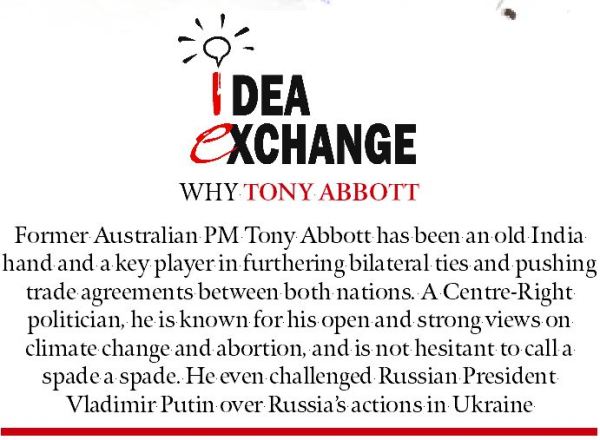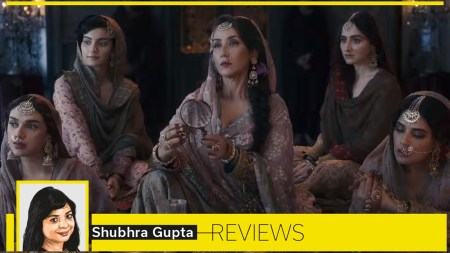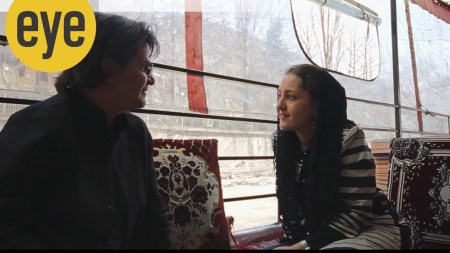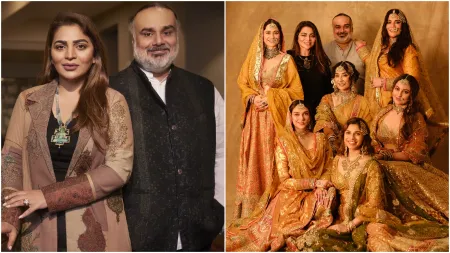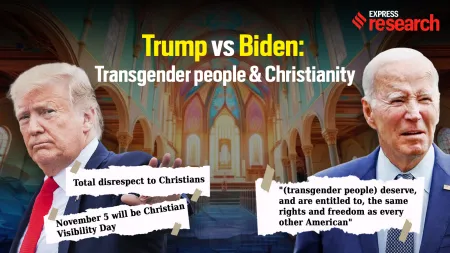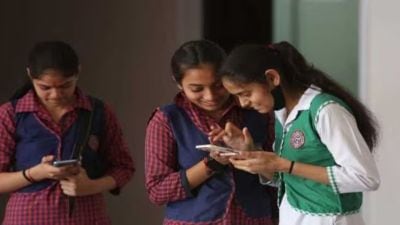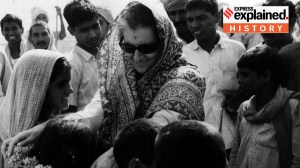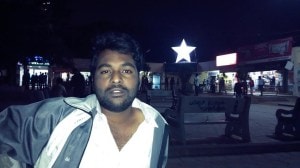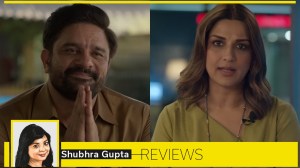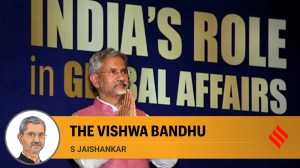- India
- International
Tony Abbott at Idea Exchange: I would very much like to see the 21st century as an Indian century. It’s better than being a Chinese century
Former Australian Prime Minister Tony Abbott on why Australia can be India’s trusted partner, Adani, trade deals and countering China. The session was moderated by Shubhajit Roy, Deputy Chief of National Bureau
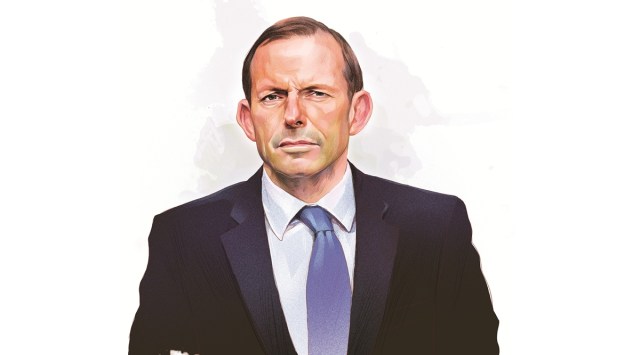 Former Australian Prime Minister Tony Abbott
Former Australian Prime Minister Tony Abbott Shubhajit Roy: You just said the India-hosted conference on geopolitics, Raisina Dialogue, is better than the World Economic Forum at Davos…
It’s much less pretentious and there is much less group think. The problem with Davos at the moment is virtue-signalling. Here there was a remarkably impressive and eclectic group of people. They had General James Norman Mattis, the former US Defence Secretary. That particular discussion with Angus Campbell, General Mattis and the Indian Chief of Defence Staff (CDS) General Anil Chauhan was very high-quality. External Affairs Minister S. Jaishankar obviously takes a close interest and it lifted the whole conversation.
Shubhajit Roy: The India-Australia relationship has undergone a transformation in the last decade or so. When you took over in 2013, there was still hesitancy about how much to move forward. How do you see the arc?
I spent three months in India in 1981 before heading off to Oxford for studies. From Bombay, I travelled through Rajasthan, went up to Delhi and Kashmir. I spent about two months at the Australian Jesuit Mission in Bihar and worked as a teacher’s aide in various schools. So, I have a very strong affection for India. Both nations have shared history, love for sports and English-speaking people. India could have gone a very different way in 1947. But what impressed me was that it chose to be a very strong democracy, with a robustly independent judiciary and a free and diverse Press. When I became Prime Minister in September 2013, I was determined to revitalise a relationship which had been taken for granted, probably on both sides, for too long.
Australia is big enough to be useful but not so big as to be intimidating or difficult. If India is to be not just a member of the Quad, but perhaps a leading member, Australia can help that happen
I was also conscious of the fact that China was an emerging challenger to the US. I figured that there was a lot to be said for having another democratic superpower that was active in the world as opposed to biding its time quietly in the sub-continent. I remember meeting then Prime Minister Manmohan Singh at the East Asia Summit in late 2013. A very impressive man, he was obviously at the end of his political career. When Narendra Modi became the new Prime Minister, I thought this was a chance to make things happen. An irritant in our relationship at that time was about Indian cultural artefacts that our national gallery had bought from some dodgy dealer. The Indian government was anxious to get them back and I thought, what better way to kick off the relationship than by doing so.
From then on, Modi was quite sympathetic, though not committed, to the idea of Quad, which was brought to life in 2007 by former Japanese Prime Minister Shinzo Abe. He made a huge effort with Modi. The third man was Chinese President Xi Jinping, whose belligerence on India helped it move away from strategic detachment and tilt towards other democracies.
I was very keen to get a trade deal with India and now that it has, within six years, there will be zero tariffs, zero quotas on Indian exports to Australia and zero tariffs or quotas for 90 per cent of Australian exports to India. Modi appreciated that a deal with Australia would be a sign of trust and solidarity. Australia is perhaps the easiest of Western countries to partner with India because we don’t have the difficult history that the UK or the US has with India. Australia is big enough to be useful but not so big as to be intimidating or difficult. If India is to be not just a member of the Quad, but perhaps a leading member, Australia can help that happen. We can tell the Americans, look, this Quad is not all about you, it’s about four countries. India is actually the biggest of them. Part of my long-term championing of India is this — just as the 19th century was a British century, the 20th century was Amercia’s, I would very much like to see the 21st century as an Indian century. That’s a lot better than it being a Chinese century.

There’s still a long way to go, particularly on the economic front. But the sky’s the limit, particularly given that there are 100,000 Indian students in Australia. Close to a million Australians of Indian background are obviously going to turbocharge the people-to-people relationship.
Shubhajit Roy: What was the conversation you had with Modi vis-a-vis China’s assertiveness?
Modi had a very strong idea about what he wanted to do with India. He wanted to feel rightly proud of its civilisational status and its vast potential. He wanted India to adopt an international role commensurate with its fundamental underlying strengths. That’s exactly what he’s done without being arrogant or difficult. He very deftly handled Russian President Vladimir Putin at Tashkent last year, saying that there was no place for war in the modern world. That was an absolutely unambiguous and unmistakable message, which was a huge rebuke to Putin. But there was nothing obnoxious about it, he was being morally obvious.
All Australian coal comes without tariff now, not just Adani’s coal. I don’t recall any senior person in the Indian government saying you’ve got to look after Adani. There has been no favouritism
Advertisement
I caught up with Modi in late 2019 after that ugly incident on the border in Ladakh. He was very alive to the difficulties of China. The Chinese are a good people but the communist regime in Beijing is different. For a long time, under Deng Xiaoping’s bide-your-time and hide-your-strength dictum, it looked to be liberalising. We now know that was always a bit of a ruse to strengthen China for its geopolitical dominance. It is absolutely determined to be the world’s number one country by mid-century. In the meantime, China has got to avenge the century of humiliation by not just crushing Hong Kong, which it has done, but by taking Taiwan by force if necessary. This is the scariest bit. Any attempt by Beijing to take Taiwan would be several orders of magnitude more disruptive and dangerous than what we’re seeing right now.
Shubhajit Roy: The MoU on civil nuclear cooperation was signed during your visit to India. But Australia had criticised the Pokhran nuclear tests of 1998. What changed?
Whenever anything new happens, it tends to shock people. But given that Pakistan almost certainly already had nuclear weapons, it’s understandable that India wanted to acquire them. There’s never been the slightest suggestion that India was going to use these things in an aggressive way. That’s the remarkable thing about Indian foreign and strategic policy since independence. Even though India is by far the dominant sub-continental power, it hasn’t sought to throw its weight around at all in an aggressive way. Obviously, it has responded to attacks from Pakistan. But it has been almost humanitarian in the way it approaches Bangladesh or Sri Lanka. So given India’s long history as a very benign actor, I think it was only right and proper that the John Howard government decided to at least be prepared to have uranium sales to India. It was short-sighted of the Kevin Rudd government to not proceed. By the time Julia Gillard was Prime Minister, the Labour Party accepted that it had made a mistake.
Sandeep Singh: What is the scope of the India-Australia trade agreement?
Just in the last couple of years, the two-way trade has gone up from $25 billion a year to about $40 billion. It’s still nothing like the trade that we do with China, which is in excess of $200 billion, even with the boycotts that China has recently applied to some of our products because we called for an independent investigation into the Wuhan virus. There’s a lot of potential. India has 1.4 billion people. Let’s assume, across the world, one in 100 is a genuinely entrepreneurial person. That’s 14 million genuinely entrepreneurial Indians. There are only 250,000 genuinely entrepreneurial Australians and three and a half million genuinely entrepreneurial Americans. India is already a startup hub, so I don’t see why, in a few decades, it won’t be economically as successful as China. India has the potential manufacturing base to do all the things that China does without the downside of the government suddenly weaponising trade against you.
Sandeep Singh: Now that China is opening up post pandemic, does the “China plus one” concept hold?
When you are a dictatorship, determined that everything must be subject to the party, you don’t care if you do yourself some significant damage. Hong Kong was testimony to other Chinese people that it didn’t have to be like the rest of China. This is why Taiwan is such a problem. It is living proof that there’s no totalitarian gene in the Chinese DNA. The Taiwanese are both a lot richer and vastly freer than the Chinese.
Shubhajit Roy: During your prime ministership, the Adani group began investing in Australia. Has the Hindenburg report alleging the group’s irregularities affected this process?
It’s easy to make allegations. The important thing is the presumption of innocence. Let the regulators look into what has been alleged but Gautam Adani made a very large investment to open a new coal mine in central Queensland. He was blocked at every turn, sometimes by the government, at other times by activist groups exploiting legal processes. He persevered. I want to thank him for the faith he showed in Australia. Even though the mine is a little smaller than it was originally intended, it’s still very big for jobs. The coal that comes to India is going to help more than the millions without 24/7 power to get the power they need for modern life. As things stand, I’m extremely grateful.
Sandeep Singh: The coal comes without tariffs. Was this clause tailor-made for Adani?
Not really because all Australian coal comes without tariffs now. It’s not just Adani’s coal. The clauses were tailor-made for Australian coal exporters and for Indian consumers, which ultimately mean cheap reliable power. I have not the slightest recollection of any senior person in the Indian government saying you’ve got to look after Adani. There has been no favouritism.
Vaidehi Thakkar: Why do you think China invading Taiwan will be more disruptive than Russia’s intervention in Ukraine?
That’s because the Taiwanese will fight and there will be massive destruction. Taiwan produces 70 per cent of the world’s microchips. The South China Sea, through which more than 50 per cent of the world’s seaborne trade goes, will be completely disrupted. Trade will halt instantly. Taiwan is a vastly more important economic player than Ukraine. Almost certainly, the heaviest sanctions will be applied to China. And that will be massively disruptive too.
Anant Goenka: Can you talk about climate change because India is a big part of this battle.
Let’s try to get emissions down as far and as fast as we can. But if we have to choose between reducing emissions and either keeping the lights on in Australia or getting the lights on in India, I’d keep the lights on. I regard myself as an environmentalist but don’t think we should be obsessive about emissions. The fundamental problem with the climate push is that we move from fossil fuels to renewables. For that we need power 24/7 and neither the wind blows, nor the sun shines 24/7. This is where something like what Dr Prateek Kanakia, Chairman and Founder, The Green Billions Limited, is doing — turning municipal waste into power — is vastly more useful than overdoing the renewable thing too quickly.
I know green hydrogen is the Holy Grail here. If it is possible to overcome the massive technical difficulties of doing this at scale, great. But we’re a long way from that. In the meantime, turning the non-recyclable municipal waste into energy, with the best possible means of incineration, dealing with any toxicity, upgrading our coal plants so that they are least-emitting as opposed to most-emitting and using more gas are sensible ways to go. The only technologically proven way of producing zero-emissions baseload power is nuclear. Indian-American scientist Vivek Lall, who runs General Atomic, produces nuclear reactors for US submarines. These small modular reactors have been operating safely on nuclear ships for 60 or 70 years now, why not start putting them on land as well?
If climate policies are going to massively increase the expense and reduce the reliability of power, people are going to be unhappy. I think one of the real problems for the British government, in recent times, has been the spiking power prices because of over-reliance on renewables.
Anant Goenka: In Japan, the tsunami derailed nuclear adoption, right?
It did but there were no definite deaths from the Fukushima plant and there were 25,000 definite deaths from the tsunami. We learnt some lessons about further strengthening the integrity of the plants.
Shubhajit Roy: Especially after the Cold War era, the Left has given way to Right-wing governments across the world. Do you see that trend as well in your country and globally?
I think it all depends on your perspective. If you regard the BJP government as Right-wing, I think it is Centre-right. But in Australia, we’ve certainly not seen the rise of the Right. If anything, over the last decade, the so-called Centre-right party has gone more and more Left-wing and the so-called Centre-left party has gone more and more Left-wing. Look at the US. While its President Joe Biden has been stronger than many people thought he would be on defence and security matters, domestically, his is the most Left-wing American government in anyone’s lifetime.
If you look at the British Conservatives, they’re not exactly hardline Tories. This is effectively a Labour-light government. In Britain, Rishi Sunak surprised us all. There has been no move to the Right at all but political polarisation and fragmentation. If anything, in the English-speaking countries, there has been a drift to the Left as opposed to the Right. Brexit and Trump, I think, are a reaction to that rather than proof that the whole polity is becoming more Right-wing.
Shubhajit Roy: How do you see India’s position on the Russia-Ukraine war because India has not explicitly condemned and criticised Russia like Australia?
The Quad foreign ministers did put out a strong statement which Jaishankar very much subscribed to. So, India has moved a little bit. Modi also made a statement to Putin at the Tashkent meeting. One of the really interesting things at Raisina was when Russian Foreign Minister Sergey Lavrov gave that blustering, mendacious speech; he was open to mockery from the audience. I haven’t met a single person in India who doesn’t think what Putin is doing is wrong and even evil.
I can understand why the Indian government is a little bit careful about what it says because, in the old days, the Soviet Union was a friend of India. Even now, a lot of Indian armament requires Russian spare parts. I’m not going to be too critical of India because in the end, we all have to be realists. Israel, likewise, has avoided explicit condemnation of Russia because it needs to have a working relationship with Russia in Syria.
Anant Goenka: Do you think that we would be one step further behind now from getting a permanent seat at the Security Council after this?
At the very least, India and Japan should be permanent members of the Security Council. The trouble with changing anything is that the Russians and the Chinese can veto it.
Anant Goenka: Globally, be it in established countries or even developing countries, a lot of Right-wing voices and parties have gained political legitimacy. You also stand for Centre-right politics. Did you notice the shift when you ran for your post?
Let’s look at Australia. Everybody had said Abbott can’t win because he was a climate denier. I changed climate from a moral issue to an economic issue. I changed it from being just about protecting the environment to about being a big pain in your hip pocket because that’s what emissions trading schemes and carbon taxes inevitably are. In the 2010 election, which we were expected to lose, we almost won. In the 2013 election, where the carbon tax was the main issue, we won a near-record majority. In 2016, climate wasn’t an issue and the Turnbull Government almost lost its majority. In 2019, the climate was an issue because the Labour Party had a policy on emissions that was basically going to destroy the coal industry. We had a miracle win. Interestingly, in the last election in Australia, the coalition foolishly, in my view, refused to fight on climate. I am very much of the view that if the Centre-right makes climate an economic issue, as well as an environmental issue, they can be very competitive, because, in the end, the common man understands that you’ve got to have the power on 24/7. We should do our best to reduce emissions as far and as fast as possible. But we shouldn’t do it in ways which cause enormous difficulties for our cost of living and which drive our manufacturing industries offshore to countries which are not as fastidious about these clauses.
Devendra Pandey: At the 2015 Cricket World Cup, you said you can’t bat or bowl but you can sledge.
Exactly. That’s why I’m a politician. (laughs)
Devendra Pandey: Why do Australians like sledging so much?
It’s part of the fun. There’s a difference between witty sledging and offensive sledging and I hope the sledging is of the witty variety rather than the offensive variety.
Devendra Pandey: Why do Australians respect Sachin Tendulkar but love Virat Kohli so much?
They’re both outstanding cricketers. I did meet Tendulkar when I came here in 2014 and he struck me as a very impressive human being. I don’t believe I have met Kohli.
Buzzing Now
May 03: Latest News
- 01
- 02
- 03
- 04
- 05


